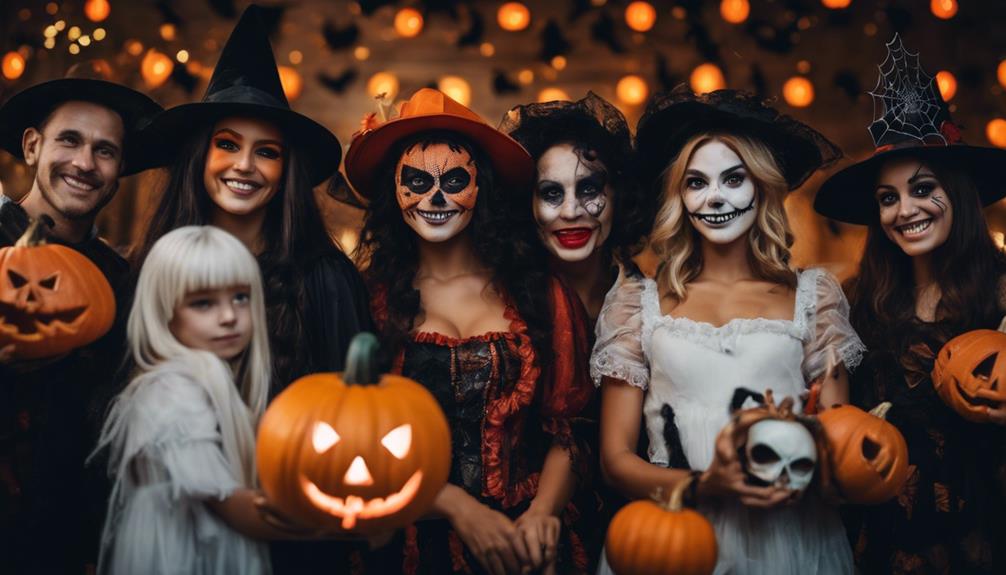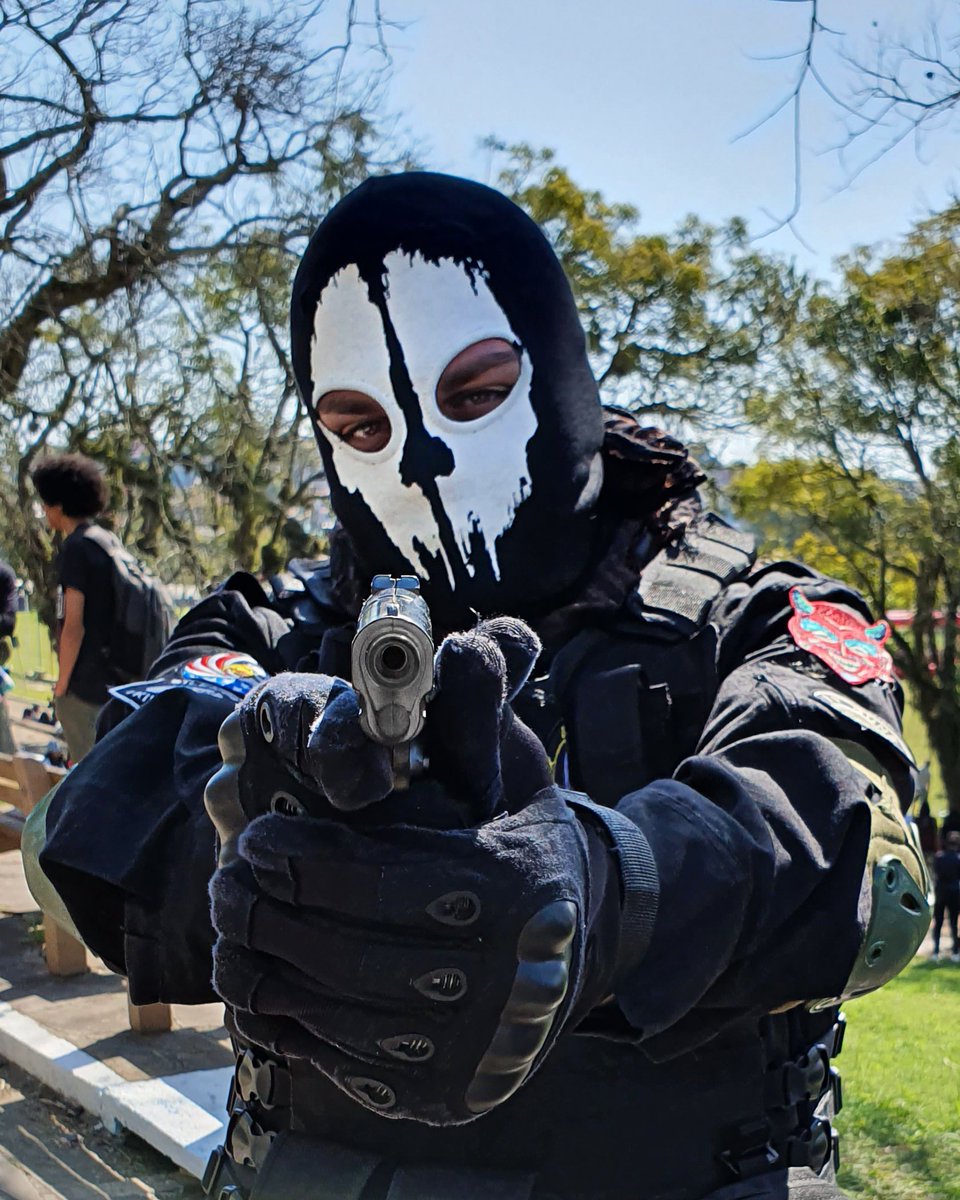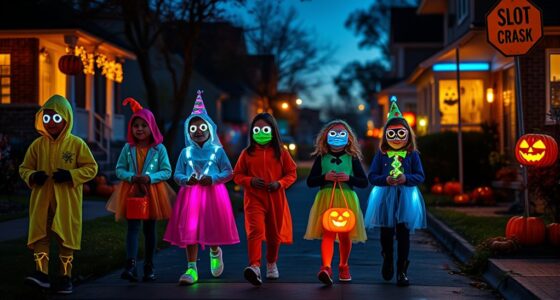Halloween is not a national holiday in the United States. It's a cultural celebration with roots in Celtic traditions. While Halloween isn't a federal holiday, it's widely observed with costumes, treats, and decorations. Businesses usually operate as usual on Halloween. It's not mandatory for employers to provide time off for the day. Despite not being a nationally recognized holiday, Halloween holds a special place in American culture with diverse activities and events. Explore more about the history, customs, and legal status to uncover the full picture of this spooky and fun-filled occasion.
Key Takeaways
- Halloween is not a national holiday in the US.
- It lacks official recognition by the government.
- Businesses operate normally on Halloween.
- There is no legal requirement for time off.
- Halloween is considered a cultural observance, not a nationally recognized holiday.
History of Halloween in the US
The origins of Halloween in the US can be traced back to Irish and Scottish immigrants who brought their traditions with them in the 19th century. These immigrants celebrated Samhain, a festival marking the end of the harvest season and the beginning of winter. Over time, their customs blended with those of other cultures, evolving into the Halloween that's familiar today.
The commercialization of Halloween began in the 1900s in the United States, with the introduction of mass-produced costumes and decorations. Despite its popularity, Halloween isn't a federal holiday in the US and isn't recognized by Christian denominations. While federal holidays in the US typically commemorate historical events, Halloween stands out as a cultural celebration.
In the US, Halloween is celebrated on October 31 by most American children, who partake in trick-or-treating, costume parties, and other festive activities.
Halloween Traditions and Customs
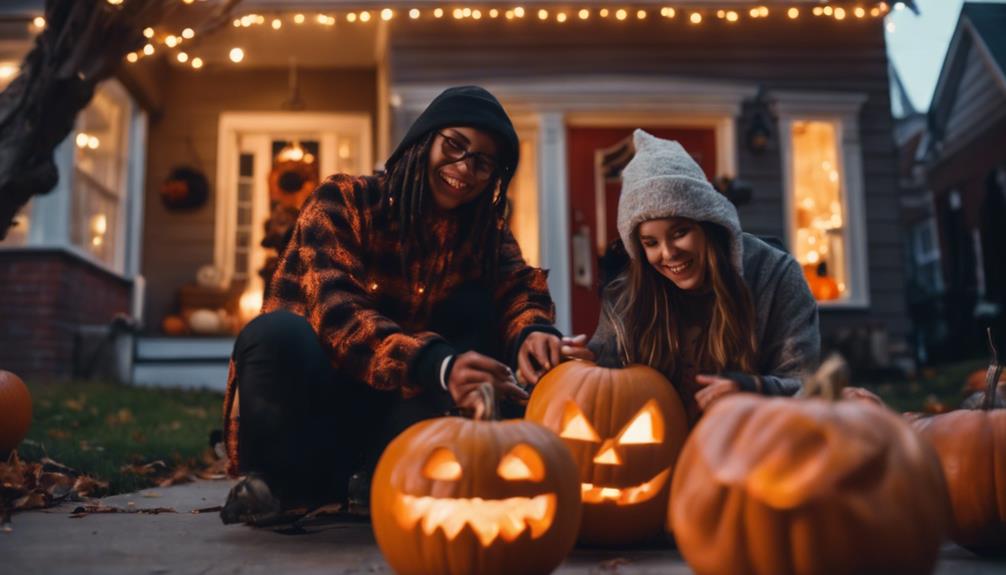
Halloween traditions revolve around dressing up as supernatural beings like ghosts, skeletons, witches, vampires, and pumpkins, with these creatures commonly spotted on the streets in the US during this spooky season.
Feasting on sweets and treats is a significant part of Halloween celebrations, alongside the popular customs of carving lanterns with scary faces and decorating homes in a Halloween style.
These traditions hold cultural significance and add a fun and eerie atmosphere to the holiday festivities.
Popular Halloween Traditions
Among the most cherished customs during this spooky season are donning costumes inspired by ghosts, skeletons, witches, vampires, and pumpkins. Trick-or-treating, where children dress up in creative outfits and visit homes to collect treats, is a popular Halloween tradition enjoyed by many. Another classic Halloween activity is carving jack-o-lanterns from pumpkins to create eerie and festive decorations. To help you visualize these traditions, here is a table showcasing some popular Halloween customs:
| Halloween Tradition | Description |
|---|---|
| Trick-or-Treating | Children in costumes visit homes for treats |
| Jack-o-Lanterns | Pumpkins carved with spooky faces and lit from within |
| Costume Parties | Gatherings where guests dress up in fun or scary costumes |
In addition to these traditions, Halloween is also a time for feasting on sweets and treats, decorating homes with spooky decorations, attending costume parties, and watching horror films. These customs all contribute to the festive and thrilling atmosphere of Halloween celebrations.
Cultural Significance of Halloween
During this spooky season, delving into the cultural significance of Halloween reveals a tapestry of traditions and customs that have evolved over time. People celebrate Halloween by dressing up as supernatural beings such as ghosts, skeletons, witches, vampires, and pumpkins, adding a mystical charm to the festivities.
In the US, the streets come alive with various supernatural creatures roaming about, enhancing the celebratory atmosphere. Feasting on sweets and treats is a common way to celebrate Halloween, bringing joy to both children and adults alike.
Popular customs associated with Halloween celebrations include bobbing for apples, carving pumpkins, and hosting lively costume parties. These traditions not only add excitement to the season but also create a sense of community as people come together to revel in the spooky spirit of Halloween.
Halloween Vs. National Holidays

In comparison to official national holidays, Halloween in the United States lacks federal recognition and doesn't grant time off work. Unlike holidays like Christmas or Thanksgiving, Halloween doesn't hold the same status in the eyes of the government. While Christmas and Thanksgiving are recognized as federal holidays, Halloween remains a cultural celebration without legal holiday status.
Employers aren't obligated to provide time off for Halloween, unlike official holidays where many businesses close their doors. Scary faces and costumes may be prevalent during Halloween, but this festivity doesn't carry the same weight as traditional national holidays.
The absence of federal recognition means that schools and most workplaces operate normally on Halloween, without the customary holiday cheer seen during other recognized holidays. Despite its popularity and widespread celebration, Halloween remains distinctly separate from the domain of official national holidays in the United States.
Legal Status of Halloween
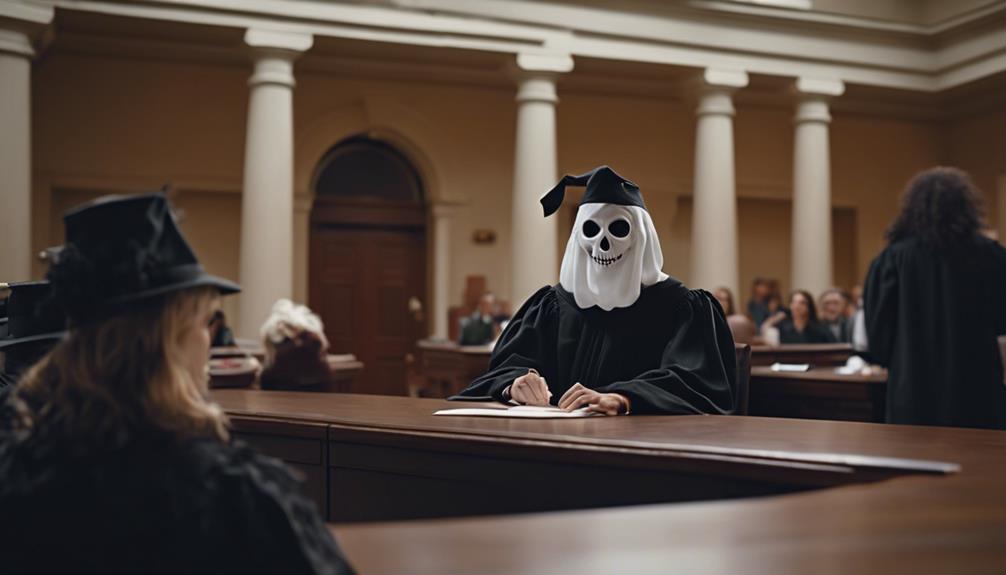
Halloween's legal status in the United States as a non-federal holiday is evident through its lack of official recognition by the government. Unlike national holidays such as Independence Day or Thanksgiving, Halloween doesn't hold the same status. It's considered a cultural observance rather than a nationally recognized holiday.
This distinction means that businesses typically operate with normal hours on Halloween, and there's no legal requirement for employers to give time off for Halloween celebrations. While many people across the country partake in Halloween festivities, from costume parties to trick-or-treating, the day itself doesn't carry the same legal weight as official national holidays.
Halloween Celebrations Across America
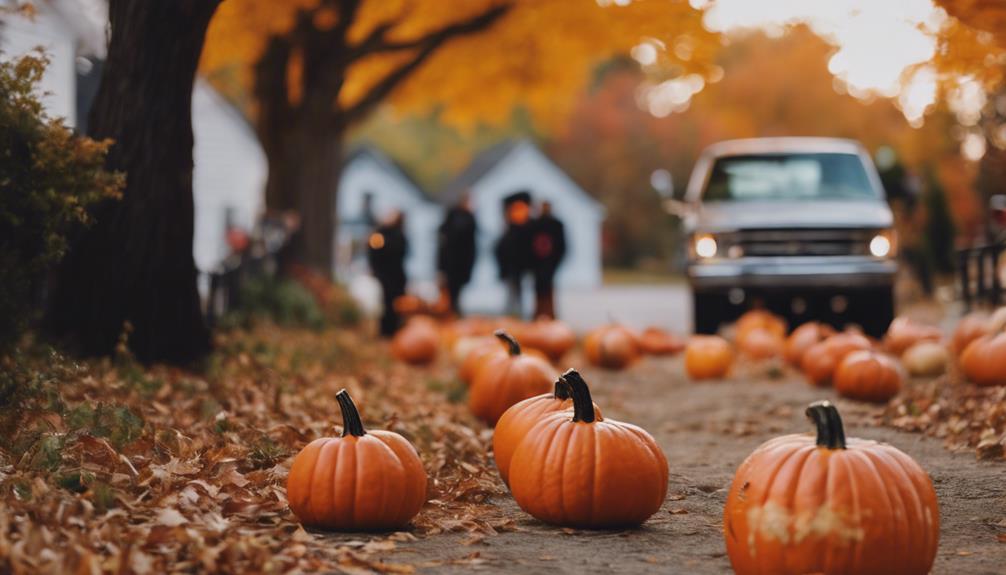
Across America, Halloween traditions vary from region to region, with unique customs and celebrations.
Popular costume trends often reflect current pop culture references, showcasing creativity and imagination.
Community events and parades bring people together to enjoy the spooky spirit of the holiday.
Regional Halloween Traditions
Embracing diverse cultural influences and historical legacies, various regions in America showcase their unique Halloween traditions with spirited flair and creativity.
On Halloween night, states like Massachusetts come alive with historic events such as haunted tours and ghost walks, delving into the chilling tales of the past.
In the Southern states like Louisiana, the spooky history is embraced through ghost tours and voodoo-themed events, adding an eerie charm to the celebrations.
California's Halloween spirit shines through extravagant costume parties, haunted attractions, and pumpkin festivals that captivate both locals and tourists alike.
Midwestern states like Illinois and Ohio offer a different kind of Halloween experience with pumpkin patches, corn mazes, and scarecrow contests, bringing a more rustic and traditional feel to the festivities.
Each region paints its own unique canvas of Halloween traditions, enriching the holiday with a tapestry of diverse customs and celebrations across America.
Popular Costumes Trends
As regions across America showcase their unique Halloween traditions with spirited flair, one aspect that unites Halloween celebrations nationwide is the ever-evolving trend of popular costumes. Halloween costume trends vary each year, but some classics like witches, vampires, cats, ghosts, and pirates consistently make the top choices list. Superheroes such as Batman, Spider-Man, and Wonder Woman are perennial favorites among children trick-or-treating. Pop culture heavily influences costume trends, with characters from movies, TV shows, and video games being popular choices for Halloween attire. Additionally, classic spooky costumes like zombies, skeletons, and mummies remain timeless options for those looking to add a scare factor to their Halloween ensemble. For a more budget-friendly and creative approach, many opt for DIY costumes using simple materials like cardboard and face paint, allowing for a personalized touch to the Halloween festivities.
| Popular Costumes | Description |
|---|---|
| Witch | Classic choice with a touch of magic |
| Vampire | Elegant and spooky, perfect for Halloween |
| Superheroes | Powerful and iconic costumes for kids and adults |
| Pop Culture Icons | Characters from movies, TV shows, and games |
Community Events and Parades
Get ready to immerse yourself in the vibrant tapestry of Halloween celebrations unfolding in communities all around America through a myriad of exciting events and parades.
Community events and parades are common across the United States during Halloween, bringing people together in festive and thrilling ways. Many cities and towns organize Halloween parades that feature elaborate floats, creative costumes, and lively music, captivating both locals and tourists alike. These parades add to the celebratory spirit of the holiday, showcasing the creativity and enthusiasm of the community.
Additionally, community events during Halloween often include a range of activities such as pumpkin carving contests, costume competitions, and thrilling haunted houses. These events offer opportunities for individuals of all ages to participate and enjoy the Halloween season, fostering a sense of togetherness and fun within the community.
Cultural Significance of Halloween
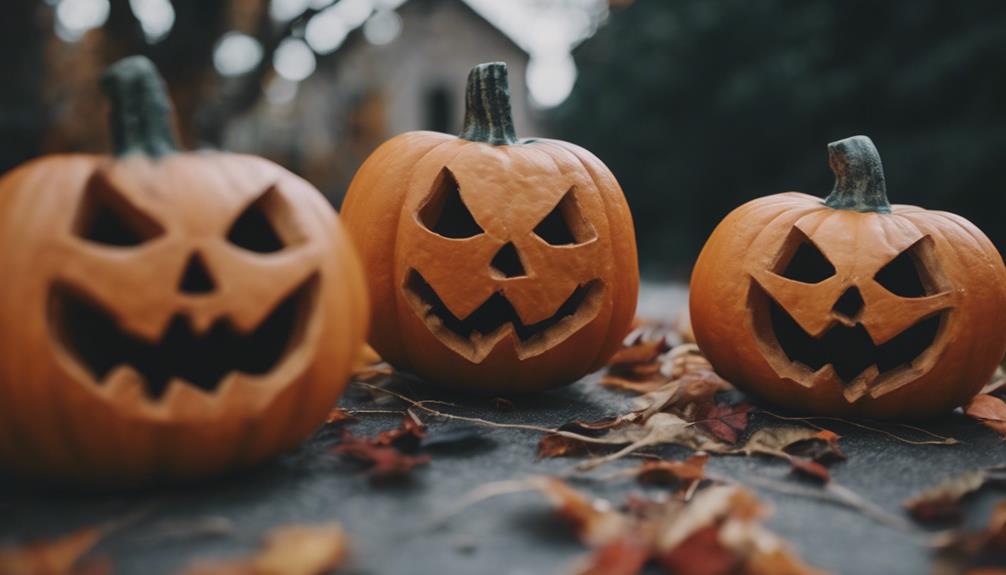
The cultural significance of Halloween stems from its rich history rooted in ancient Celtic traditions. Halloween, originally known as Samhain, marked the end of the harvest season and the beginning of winter in Celtic communities. It was believed that on the night of October 31st, the boundary between the living and the dead blurred, allowing spirits to roam the earth. To ward off these spirits, people would dress in costumes and light bonfires.
Over time, Christian influences merged with Celtic traditions, and Halloween evolved into a day to honor saints and pray for souls in purgatory. Today, Halloween is celebrated with various activities such as dressing up in costumes, going trick-or-treating, and partaking in festive gatherings. While Halloween isn't a national holiday, it has become a significant cultural event, with billions spent on costumes, decorations, and candy. Its global impact is evident in the diverse ways different cultures worldwide observe and celebrate this spirited occasion.
Public Perception of Halloween
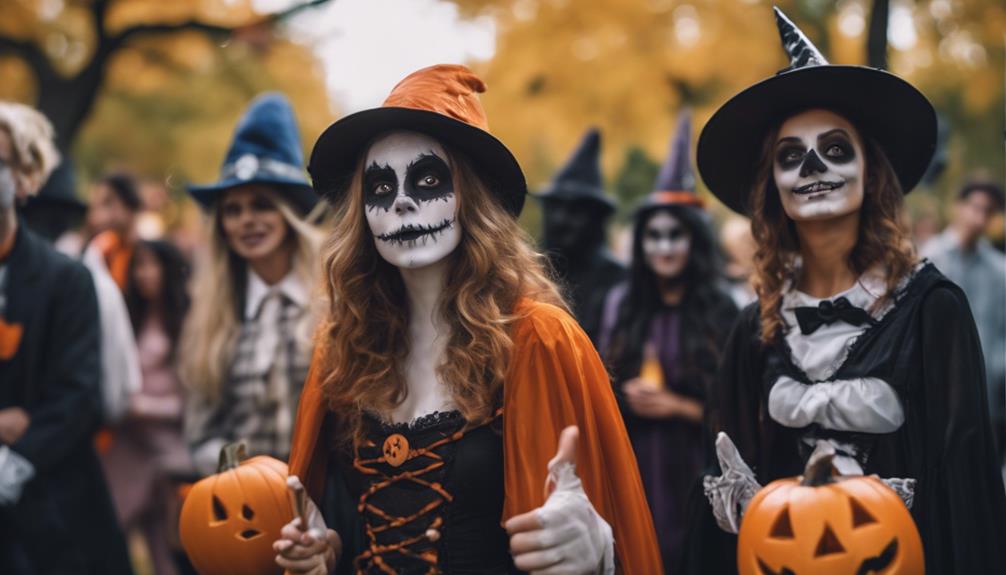
Public perception surrounding Halloween varies widely, reflecting diverse views on its status as a national holiday. When it comes to Halloween, people have different opinions, shaping how they perceive this festive time. Here are some key points to take into account:
- For some, Halloween is a fun and exciting celebration, filled with costumes and treats, making it a special day for many.
- However, Halloween isn't an official federal holiday in the United States, which surprises some individuals who assume it holds that status.
- While some see Halloween as a holiday, others argue that it lacks the necessary recognition from Christian denominations to be categorized in this way.
- Despite its widespread celebration on October 31, Halloween is typically not recognized as a day off by employers, distinguishing it from traditional holidays.
The debate over whether Halloween should be regarded as a national holiday continues, with varying perspectives shaping public opinion on this festive occasion.
Future Outlook for Halloween
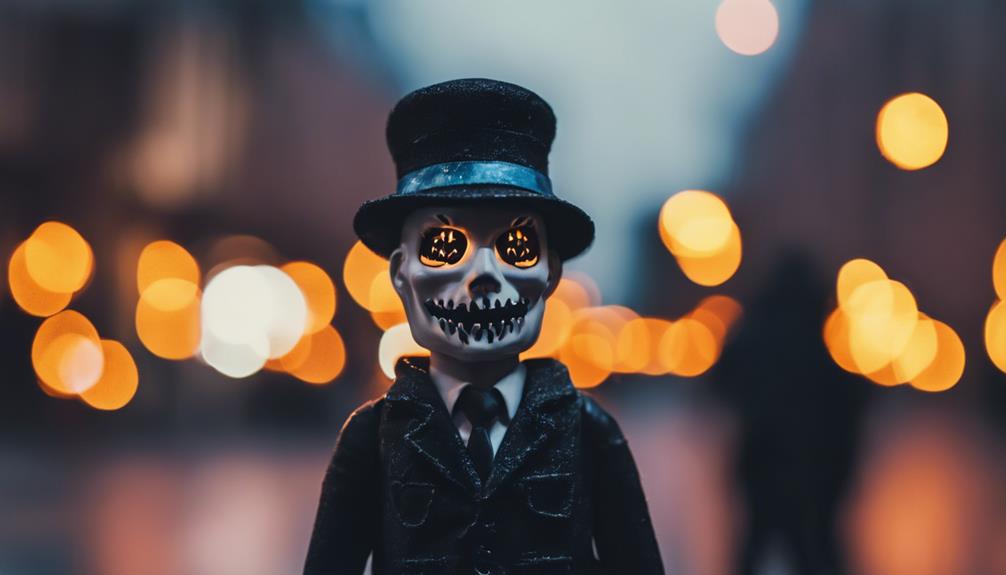
Looking ahead, consider the evolving trends shaping the future outlook for Halloween. As Halloween continues to be widely celebrated by American kids on October 31, with millions of children enjoying dressing up and indulging in treats, the holiday's future looks promising. Although not a national holiday like those designated to honor historical events, Halloween holds a special place in the hearts of many. Let's take a closer look at some potential directions that Halloween could take in the future:
| Trends Shaping Halloween's Future | Impact on Celebration |
|---|---|
| Sustainability Initiatives | More eco-friendly costumes and decorations. |
| Virtual Celebrations | Online events for those unable to participate in traditional activities. |
| Inclusive Costumes | Embracing diverse cultural representations in costume choices. |
| Health-Conscious Choices | Focus on healthier treat options and safety measures during celebrations. |
These trends indicate a shift towards a more inclusive, sustainable, and health-conscious approach to celebrating Halloween in the future.
Frequently Asked Questions
Is Halloween a National Holiday in Us?
Halloween isn't a national holiday in the US. It isn't recognized as an official holiday by the government. Businesses typically operate with regular hours on Halloween.
Trick-or-treating is a common activity, but it doesn't make Halloween a national holiday. Public transit services and government offices run on normal schedules during Halloween.
Keep in mind that Halloween is more of a festive occasion rather than a national holiday with official recognition.
Why Is Halloween Not Recognized as a Federal Holiday?
Halloween isn't recognized as a federal holiday because it lacks official status and isn't observed by Christian denominations as a religious holiday. While it's a popular cultural observance, it doesn't meet the criteria for a national holiday in the United States.
Despite its widespread celebration, Halloween remains a day where employers typically don't grant time off. This distinction contributes to its status as a non-federal holiday.
What Are US National Holidays?
US national holidays include:
- New Year's Day
- Martin Luther King Jr. Day
- Presidents' Day
- Memorial Day
- Independence Day
- Labor Day
- Columbus Day
- Veterans Day
- Thanksgiving Day
- Christmas Day
These holidays are significant for banks, schools, and government offices, impacting their operating hours. They often hold historical or cultural significance, marking important events or honoring specific individuals.
Federal employees typically have these days off, and they're widely celebrated with special traditions and gatherings.
Is Halloween a Business Holiday?
Halloween isn't considered a business holiday since it doesn't impact regular business operations or schedules. Unlike traditional holidays with closures, Halloween doesn't lead to special business activities or closures.
While retail businesses may see sales boosts from Halloween merchandise, it's not an official business holiday. You can expect businesses to operate as usual during Halloween, with no specific changes to their regular hours or operations.
Conclusion
In the tapestry of national holidays, Halloween may not be officially recognized, but its cultural significance and widespread celebrations across America make it a beloved tradition for many.
While it may not have the legal status of a national holiday, the spirit of Halloween lives on through its history, traditions, and the joy it brings to communities each year.
So, whether it's a national holiday or not, Halloween continues to be a time of fun, creativity, and spooky delights for all.
